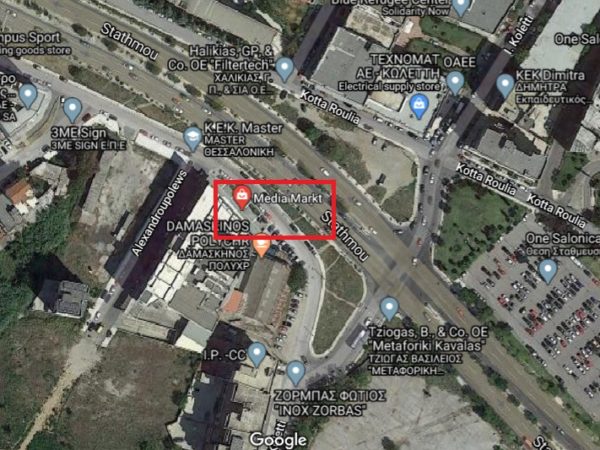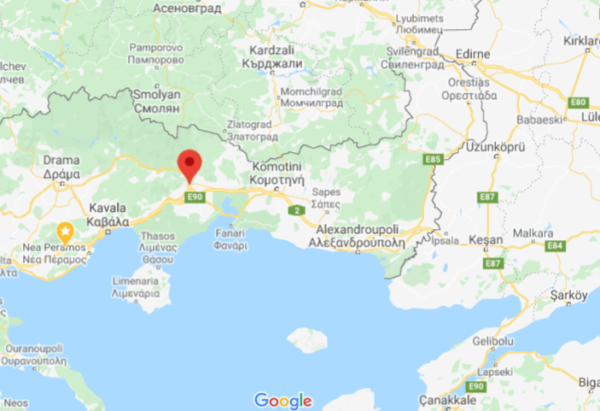In this incident, 70 people were removed from Greece to Turkey across the Evros river. Two respondents were interviewed: a Moroccan man, who had arrived in Greece on 24th February 2020 and was issued a “khartia” (a temporary residency paper) two days latter, and another Moroccan man who had arrived in March but did not hold any documents in Greece. The two men were living in squats in Thessaloniki when they were seized by the police on 24th April 2020 alongside a large group of other people.
The first respondent (who had received a khartia in February) was stopped by Greek police officers close to the Media Markt shop on Νέα Δυτική Είσοδος Κωλέττη, Thessaloniki 546 27. He was with a friend walking close to the shop and Greek police officers captured them both. The officers made them put their valuables (phones, money) in a plastic bag and then put the men in a car. Once put into the vehicle, the pair found that other friends they knew from the area where already detained inside.

The police drove away and proceeded to make a tour of the city collecting more people from the street. The respondent describes the use of a white Transit van and a regular patrol car to pick up 12 people in total. A similar process resulted in the pickup of the second respondent. He described being outside a cafe near the central train station (Thessaloniki Train Station) and a police car drawing up, and two officers exiting the vehicle. The officers, dressed in blue, asked him “do you have khartia” and then took him, along with a 19 year old from Pakistan, who was stood outside the same cafe.
Neither of the respondents knew where they were being taken. One describes being taken through three police stations. In the first station, at around 19:30, he had all his possessions removed by police (15 euros, a powerbank, a mobile phone, rings, a sliver bracelet, an asthma inhaler). In the second station he was held for three hours with no information or processing. In the third station (where he arrived at around 23:00), the respondent spent one night and was made to sign some paperwork in Greek, as well as having his fingerprints taken. He was not given any food or water.
Both captured persons were transferred, along with others, in vehicles to a larger detention space around two hours away from Thessaloniki. One respondent reported that in this space, which was described as a “prison”, the Greek authorities removed more of their possessions. This time clothes and shoes were taken, leaving the men in only their trousers and shirts.
Inside the facility the officers didn’t let the detained persons speak or raise their heads. One respondent alleges a person received a broken hand after being struck violently by the police in the detention space. There were other people held in the detention space and the officers brought a large bus. The bus was blue with barred (partially covered) windows. Inside was 10 divided compartments which were used to hold small groups of people (this matches the description of vans used by the Greek riot police). 36-40 people were loaded into the van.
“They collected them from other jails, the other people in the bus, as they collected them in the street, you are not allowed to look but I looked and I saw the rooms were full”
The bus left the detention space in the morning on the 25th April 2020. It drove for around 3 to 4 hours. Inside were people from several countries, including Algeria, Morocco, Pakistan, Afghanistan and Iran. Most were aged between 20 and 40 years old. There was one woman from Iran aged around 42.
The respondents describe being unloaded at a site near the border with Turkey. It was reported that it was not a formal prison, but like an “isobox” with windows. They could not recall many features of the space because they were ordered to keep their heads down while waiting.
At this space, between 40 and 60 people (including women and minors) were already being held. The respondents recall seeing people from Afghanistan, Pakistan, Syria, Iran, Sri Lanka and Morocco. It was reported that there were around seven unaccompanied minors aged around 15-16, and women in the detained group. Some people had injuries from the Greek authorities, the respondent said that the people followed the authorities’ orders because they thought the police would give them papers or move them to another place.
“If someone don’t walk or don’t move or ask something they beat the person, you can see a lot of people with broken arm in the commandos area”
The authorities were described as “commandos” or “cagoule” because of the military attire and face masks they were wearing. The respondents report being held a short time at this location until a larger dark metal truck was used to load between 50 and 70 detained persons inside. This occurred at about 18:30 on 25th April 2020. The people were taken by the Greek authorities to the Evros/Meric river. The drive time was approximately 40 minutes. The respondents describe passing divisions of the Greek military on the way who stopped and spoke to the drivers of the vehicle.
At the river, described as in the delta area between Ipsala and Uzunköprü, the group were unloaded by a further division of Greek authorities at around 19:00. Some of these officers were dressed in the same military uniform, while others were in civil clothes. The authorities apparently had at least one inflated boat and three Toyota vehicles with them.
“commandos speaks all the languages, speak English, speak German, if you raise your eyes they will beat you, we were like animals, only look down and if you try to do anything they beat you”
The respondent said the officers spoke in English with them, and when one of them asked for his friend for a lighter, the officer replied “sorry” in German. One respondent also suggested that some of the plain clothes officers could also speak Bulgarian.
Close to the river the group were made to wait on the floor, officers shouting:
“sit down! sit down! shut up! sit down!”
They were taken in groups of around 10 to the boat. The respondents recall being forced to approach the boat in a kneeling position, shuffling on their knees in an uncomfortable fashion.
The officers were carrying guns and batons. Some of them were also reportedly holding electric taser devices. One respondent recalls being threatened with the taser close to his ear as he was at the river bank.
“they were beating them with the stick when they passed near them you hear the sound of the electric gun [taser], put it next to your ear, put it next to your head, because you are supposed to hold your head down”
The respondents recall being loaded into the boats and then driven quietly across to Turkey. The drivers of the boats were described as Pakistanis or Afghans from the transit community. The boat docked on the Turkish side and the affected groups dispersed, looking for help from locals in the nearby villages. One respondent sought help at a local mosque where he received food, shoes and clothes.
Of approximately 50 persons pushed back, a small group of friends who had known each other in Thessaloniki recrossed into Greece on the afternoon of 25th April 2020. The group, composed of adults from Morocco and Algeria, traveled for 12 days in order to reach Thessaloniki. On the way however, close to Xanthi, one Moroccan man was the victim of a hit and run by a Greek driver who swerved to injure the group as they walked along a road that ran close to highway number 2. The driver, who allegedly had two children in the passenger seats, swiped the one mans legs, causing a severe break.

The driver then escaped without stopping. Frightened for their friend’s well being, the rest of the transit group tried to stop multiple cars in order to alert the emergency services. Eventually one member of the public stopped and helped to call an ambulance. The friends waited with the injured man, but then concealed themselves in some nearby bushes when the ambulance arrived because it was accompanied by Greek police. The ambulance took the man away, escorted by police. At the time of interview, the transit group had no further information where their friend was or what his physical condition was like. The man was not contactable by phone and the group had no idea which hospital he had been taken to, only that he had been picked up by the ambulance in the area of Xanthi.
